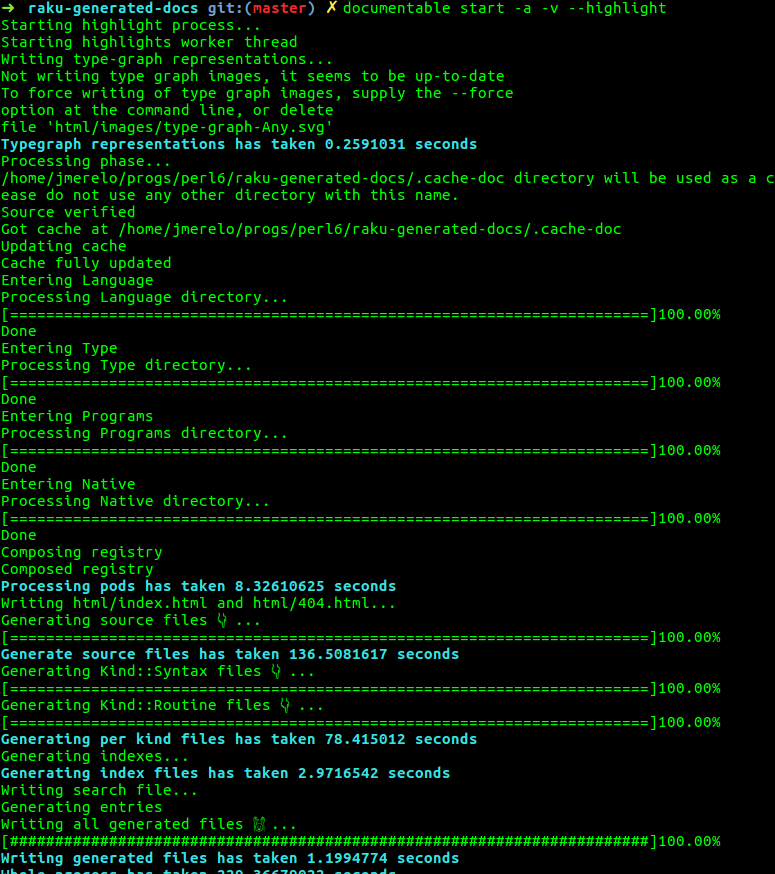✎ Doccing Raku🖊
@jjmerelo, github.com/JJ
Raku Doccer in (Mis)Chief
Writer of Important Things
⇒ You work out the acronym
📖📚❗❗
3 parts
Doc project
Doc all things
1 || 2 futures
Documentation is important
HOW do you do it? 🤔
=begin pod :kind("Type") :subkind("class") :category("exception")
=TITLE class Failure
=SUBTITLE Delayed exception
class Failure is Nil { }
A C<Failure> is a I<soft> or I<unthrown> L<Exception|/type/Exception>,
usually generated by calling C<&fail>. It acts as a wrapper around an
L<Exception|/type/Exception> object.
=for comment
A lot of more stuff here
=end pod
Searchable
Findable
Indexable
Referenceable
We need Documentable
#| Everything documented inherits from this class
class Documentable {
has Str $.name;
has $.pod is required("Needs an actual document");
has Kind $.kind is required("Is essential metadata");
has @.subkinds = [];
has @.categories = [];
🕮 Literary programming 🕮
Documentation is precompiled
Work by Antonio Gámiz based on Richard Heinsworth's Pod::To::Cached
Register everything
my $registry = Documentable::Registry.new(
:$topdir,
:dirs( $doc-dirs ),
:$typegraph-file
:verbose($v)
);
$registry.compose; Use the cache, Luke
if ( $!use-cache ) {
$!pod-cache = init-cache( $!topdir, $!verbose);
say "Updating cache";
$!pod-cache.update-cache;
}
Parse, index, repeat
Generate HTML
my %pod-to-render = Documentable::DocPage::Secondary.new.render($!registry, $name, $kind);
my Str $html = $!wrapper.render( %pod-to-render,
$kind.Str,
);
return %(
document => $html,
url => %pod-to-render
) Generation

Ship it
rsync -avu -e .
docs.raku.org@xxx.atikon.io:/var/www/docs.raku.org/
With thanks to Roman Baumer and the Atikon people providing this infra
HOW do you write it? ¯\_(ツ)_/¯
Find out about it
Parse ChangeLogs
use LWP::Simple;
my $release = @*ARGS[0] // "2019.03";
my $document = LWP::Simple.get("https://raw.githubusercontent.com/rakudo/rakudo/master/docs/announce/$release.md");
my @parts = $document.split("\n +");
my $additions-removals = @parts[1,2,3].map: "\n# " ~ * ;
$additions-removals ~~ s:g/\s\s\s\+\s/* [ ] /;
$additions-removals ~~
s:g[ \[(<alnum>+)\] ] =
"-[$0](https://github.com/rakudo/rakudo/commit/$0)";
print $additions-removals;Use the source and context

Blame helps with context

With helpful commit messages

Spec ≠ Rakudo ≠ Implementation
# https://github.com/rakudo/rakudo/issues/2568
{
is-deeply 3 ~ ( 5 | "18" ), any("35","318"),
"does a junction survive ~ Junction";
is-deeply ( 5 | "18" ) ~ 3, any("53","183"),
"does a junction survive Junction ~";
is-deeply ( 5 | "18" ) ~ ( 3 | 6), any("53","56","183",186),
"does a junction survive Junction ~ Junction";
}Understand what it does
Produce examples
Go viral
my &fail-routine = &fail;
unless &fail-routine.is-implementation-detail {
say "&fail is not an implementation detail, can expect backward compatibility";
}
sub PRIVATE-CALCULATION is implementation-detail {
#`(Not safe to rely on this)
}
if &PRIVATE-CALCULATION.is-implementation-detail {
say "You better not to rely on &PRIVATE-CALCULATION unless you really know what you are doing";
}